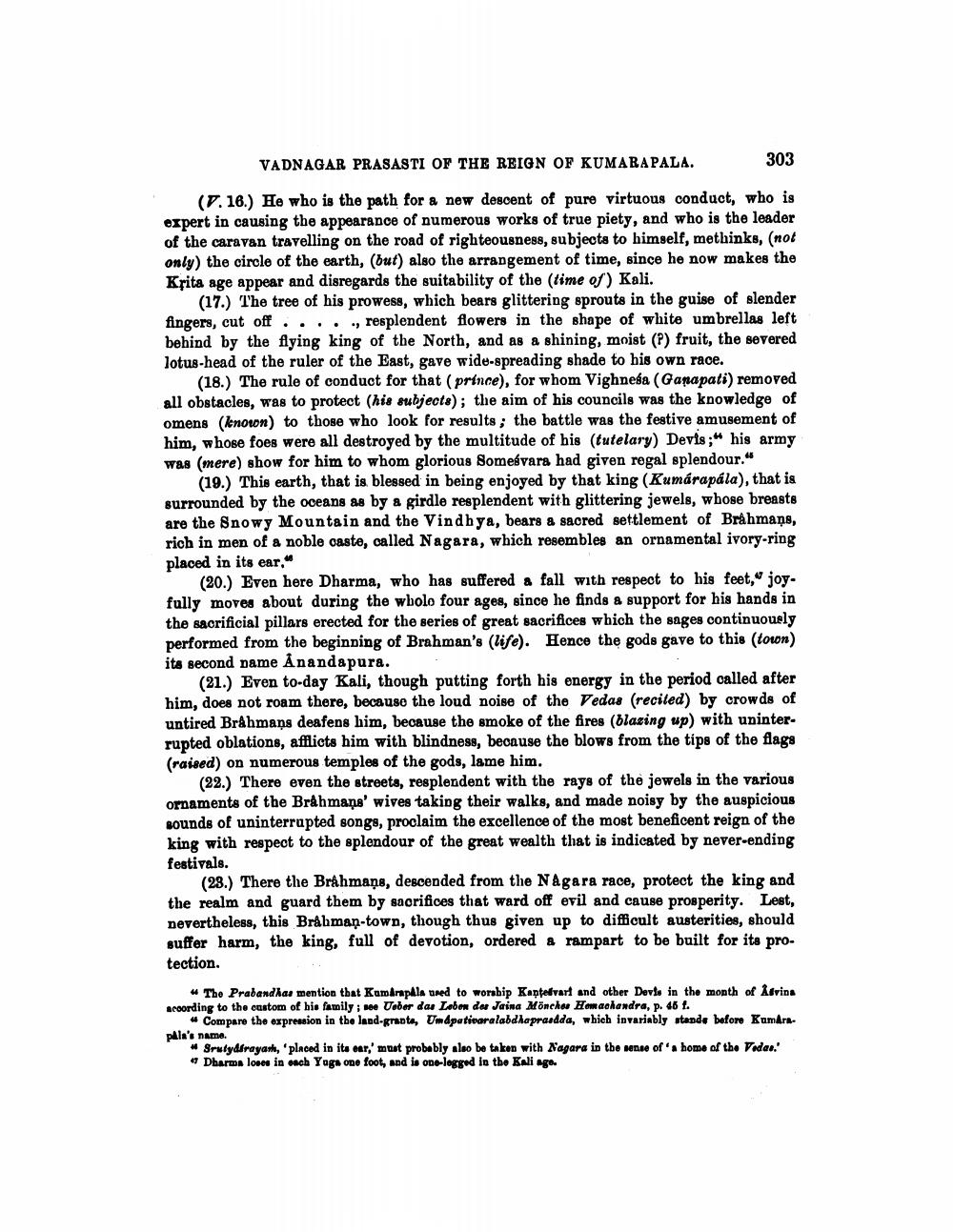________________
VADNAGAR PRASASTI OF THE REIGN OF KUMARAPALA.
303
(V. 16.) He who is the path for a new descent of pure virtuous conduct, who is expert in causing the appearance of numerous works of true piety, and who is the leader of the caravan travelling on the road of righteousness, subjects to himself, methinks, (not only) the circle of the earth, (out) also the arrangement of time, since he now makes the Krita age appear and disregards the suitability of the time of Kali.
(17.) The tree of his prowess, which bears glittering sprouts in the guise of slender fingers, cut off ....., resplendent flowers in the shape of white umbrellas left behind by the flying king of the North, and as a shining, moist (?) fruit, the severed lotus-head of the ruler of the East, gave wide-spreading shade to his own race.
(18.) The rule of conduct for that (prince), for whom Vighnesa (Ganapati) removed all obstacles, was to protect (his subjects); the aim of his councils was the knowledge of omens (kenoron) to those who look for results; the battle was the festive amusement of him, whose foes were all destroyed by the multitude of his (tutelary) Devis;" his army was (mere) show for him to whom glorious Somebvara had given regal splendour.“
(19.) This earth, that is blessed in being enjoyed by that king (Kumarapala), that is surrounded by the oceans as by a girdle resplendent with glittering jewels, wbose breasts are the Snowy Mountain and the Vindhya, bears & sacred settlement of Brahmans, rich in men of a noble caste, called Nagara, which resembles an ornamental ivory-ring placed in its ear,
(20.) Even here Dharma, who has suffered a fall with respect to his feet, joy. fully moves about during the wbolo four ages, since he finds a support for his hands in the sacrificial pillars erected for the series of great sacrifices which the sages continuously performed from the beginning of Brahman's (life). Hence the gods gave to this (town) its second Dame Anandapura.
(21.) Even to-day Kali, though putting forth his energy in the period called after him, does not roam there, because the loud noise of the Vedas (recited) by crowds of untired Brahmans deafens him, because the smoke of the fires (blazing up) with uninterrupted oblations, afflicts him with blindness, because the blows from the tips of the flags (raised) on numerous temples of the gods, lame him.
(22.) There even the streets, resplendent with the rays of the jewels in the various ornaments of the Brahmana' wives taking their walks, and made noisy by the auspicious sounds of uninterrupted songs, proclaim the excellence of the most beneficent reign of the king with respect to the splendour of the great wealth that is indicated by never-ending festivals.
(28.) There the Brahmaņs, descended from the Nagara race, protect the king and the realm and guard them by sacrifices that ward off evil and cause prosperity. Lest, nevertheless, this Brahman-town, though thus given up to difficult austerities, should suffer harm, the king, full of devotion, ordered & rampart to be built for its protection.
Tho Prabandhas mention that Kumarapala ured to worship Kapte vart and other Devis in the month of Livina according to the custom of his family; nee Uober das Leben der Jaina Möncha Homachandra, p. 46 t.
Compare the expression in the land-grante, Umdpativaralabdhapraadda, which invariably stands before Kumarapala's name.
# Srutydfrayant, placed in its ear,' must probably also be taken with Nagara in the sense of home of the Vodar.' e Dharma loves in each Yoga one foot, and is one logged in the Kalingo.




